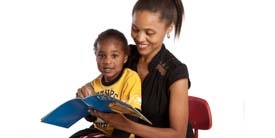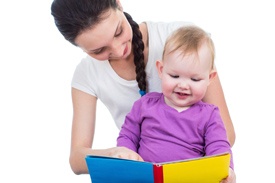Language is how a mother tells her baby "I love you" with a sing-song voice. It's how a 3-year-old tells a knock-knock joke while trying to hold back their laughter. It's how a teacher explains the rules of long division to her fidgety students. Language connects us, and language helps us learn.
At the most basic level, language is a set of symbols that a community has agreed upon to stand for objects and ideas. You use these symbols to talk listen, read, and write. In the case of American Sign Language, you use language to produce signs and interpret signs. Having effective language skills means that you can express your ideas and can understand when others express their ideas. Language is uniquely human, and babies begin to build the foundation for language even before they are born!
It can be helpful to think about the difference between language and speech. When your child says "I wuv my wed twuck," (I love my red truck), it doesn't sound right - that's the speech part - but she is sharing her thoughts on something she really likes - that's the language part.
Language includes which words you know and which words you chose to use. It is how you put those words together, the tone of voice that you use, and whether the person across from you understands what you mean. You use language to solve story problems in math class and write an essay in English class. Language skills are what allow you to build relationships with your family and friends.
Not having access to language is frustrating. Imagine being dropped in the middle of a foreign country with a pounding headache. You need to find a drug store, but how would you communicate what you need? How would you understand directions if someone did figure out what you were trying to say? You're in pain, you're confused, and you can't get your problem solved.
Now think of a two-and-a-half-year-old boy who doesn't yet say any words. His head is full of wants and needs, but he has no clear way of letting others know what they are. He also has trouble understanding what his parents want him to do when they give him simple directions. He often throws things when he can't be understood or doesn't understand what his parents want him to do. All of this is because he has difficulty with speaking and listening, that is, with language.
Language underpins everything we do, and having difficulty with language skills at any age means you can't fully participate in everyday life. Cleveland Hearing & Speech Center has a team of licensed speech-language pathologists (SLPs) with expertise in building language skills.
What is Language?
Tags: Speech, Language, Communication, literacy, Learning, Voice, toddler, talking, Early Intervention, Speech therapy
Build Preschool Language Skills While Reading to Your Child
Do you find yourself wondering how to make reading a book with your child more meaningful? Do you have a hard time trying to get your child to WANT to read a book? Here are eight fun and easy ways to engage your child when reading a book and increase their pre-literacy skills and language skills.
Tags: Speech, Communication, reading, literacy, Learning, toddler, Speech therapy
Build Better Reading Skills in Your Preschooler
Kick start your child’s pre-literacy and language skills by focusing on these areas while reading books with them. Children who develop these skills at an early age are more likely to become fluent readers and better spellers than children who do not. We define these skills as phonological awareness, which is the ability to recognize, manipulate, and use the sound structure of spoken language.
Tags: Speech, Language, Communication, reading, literacy, Learning, toddler, Early Intervention
What is Dyslexia and How is It Treated?
Dyslexia is a specific learning disability that is neurological in origin. It is characterized by difficulties with accurate and/or fluent word recognition and by poor spelling and decoding abilities. These difficulties typically result from a deficit in the phonological component of language that is often unexpected in relation to other cognitive abilities and the provision of effective classroom instruction. Secondary consequences may include problems in reading comprehension and reduced reading experience that can impede growth of vocabulary and background knowledge.
Tags: Speech, Language, Communication, literacy, Wilson Reading Program, Learning, Dyslexia
How Can I Help My Child Become a Good Reader?
Learning to read can be challenging for children. Fortunately, research is now available that suggests how to give each child a good start in reading. When parents help their children learn to read, they help open the door to a new world.
May is Better Hearing & Speech Month
Did you know…
- An estimated 40 million Americans experience speech, language, and/or hearing disorders.
- The second most common reason for special education services in public schools is speech/language impairment.
- 36 million American adults report so
Tags: Speech, Hearing Aid, Audiology, Language, Hearing Aids, Communication, Hearing, reading, literacy, Hearing Loss Prevention, Teens, Support, Caregiving, Hearing Loss, Stuttering, Learning, Voice, toddler, talking, Autism
Extra Help at Home for Your Child with Speech-Language Issues
Children who have been identified with speech-language impairments have likely established nonstandard patterns of speaking or have deficits that will require extra attention and training to improve. The speech-language pathologist (SLP) working with you and your child should serve as a "coach" to provide you with activities or homework to reinforce newly established skills and to strengthen emerging skills. One or two sessions a week is not enough, and your involvement in carryover activities is crucial to your child's communication development. Talk with your SLP about activities and games you can use at home to help.
Tags: Speech, reading, literacy, Teens, Support, Learning, Voice, toddler, talking
When and How Should I Read to My Child?
Experts recommend you read to your child as often as you can and that you strive to have at least one scheduled reading time each day. Choosing regular times to read (especially before naps and bedtime) is a way to help your child learn to sit with a book and relax. But you can read anytime your child seems in the mood.
If your toddler will let you, hold him or her in your lap when you read. It's a great spot for:
Tags: Speech, Language, Communication, literacy, Learning, Voice, toddler, talking
Why Should I Read to My Toddler?
Reading aloud is an important way to help your child make the transition from infancy into their toddler years. Between the ages of 1 and 3, your child will have triumphs and challenges. Studies show that children with an active exposure to language have social and educational advantages over their peers - and reading is one of the best ways to expose your child to language.
Tags: Speech, Language, Communication, reading, literacy, Learning, toddler
Pre-Literacy Skills for Preschoolers
Children ages 3-5 are considered to be preschool-age. During this time, it is important to lay a strong foundation of language and literacy skills. Early exposure to a variety of language concepts and literacy themes can prepare your child for success in preschool and ensure they have adequate time to master skills that will help them to thrive in kindergarten.
Tags: Speech, Communication, reading, literacy, Learning

















